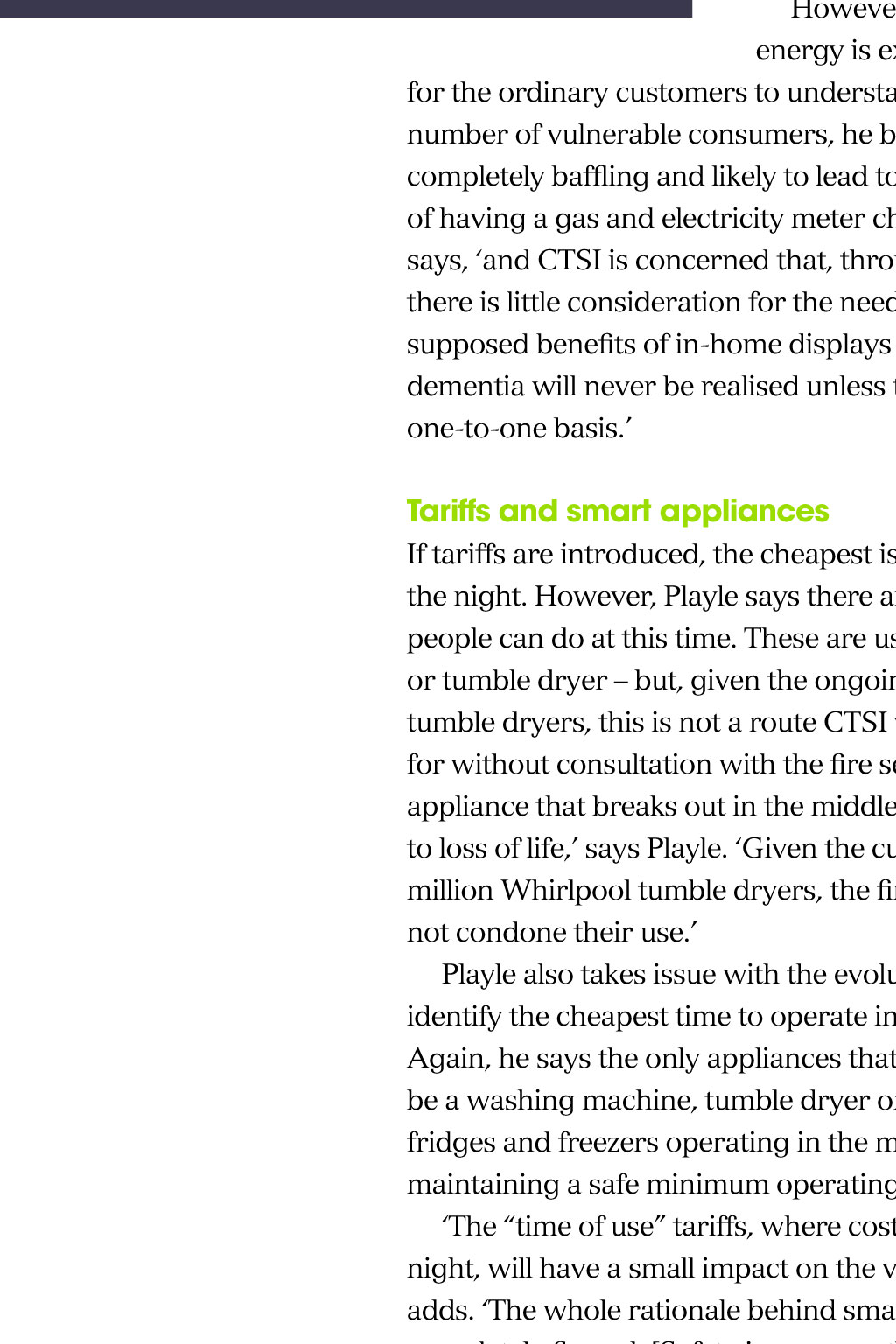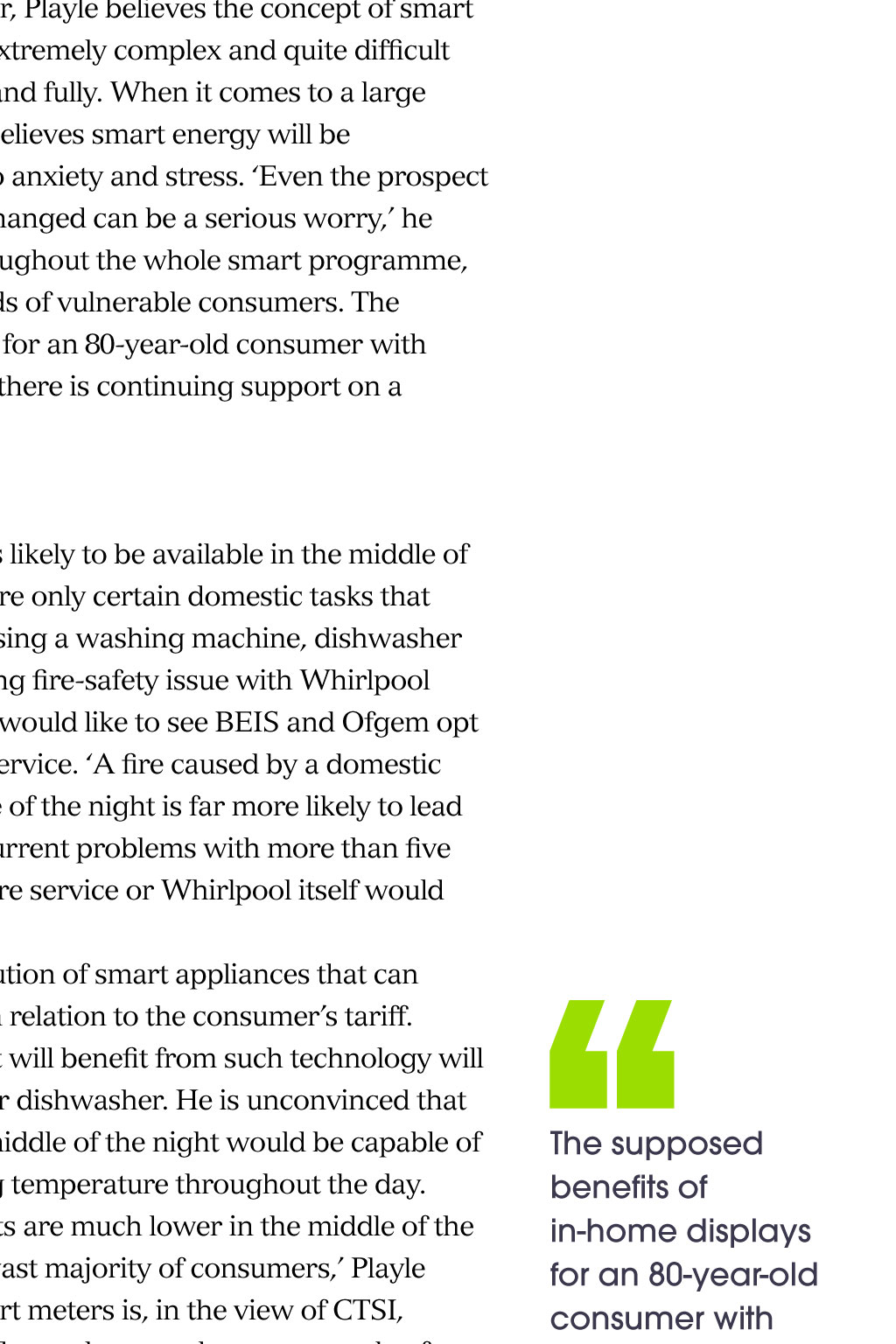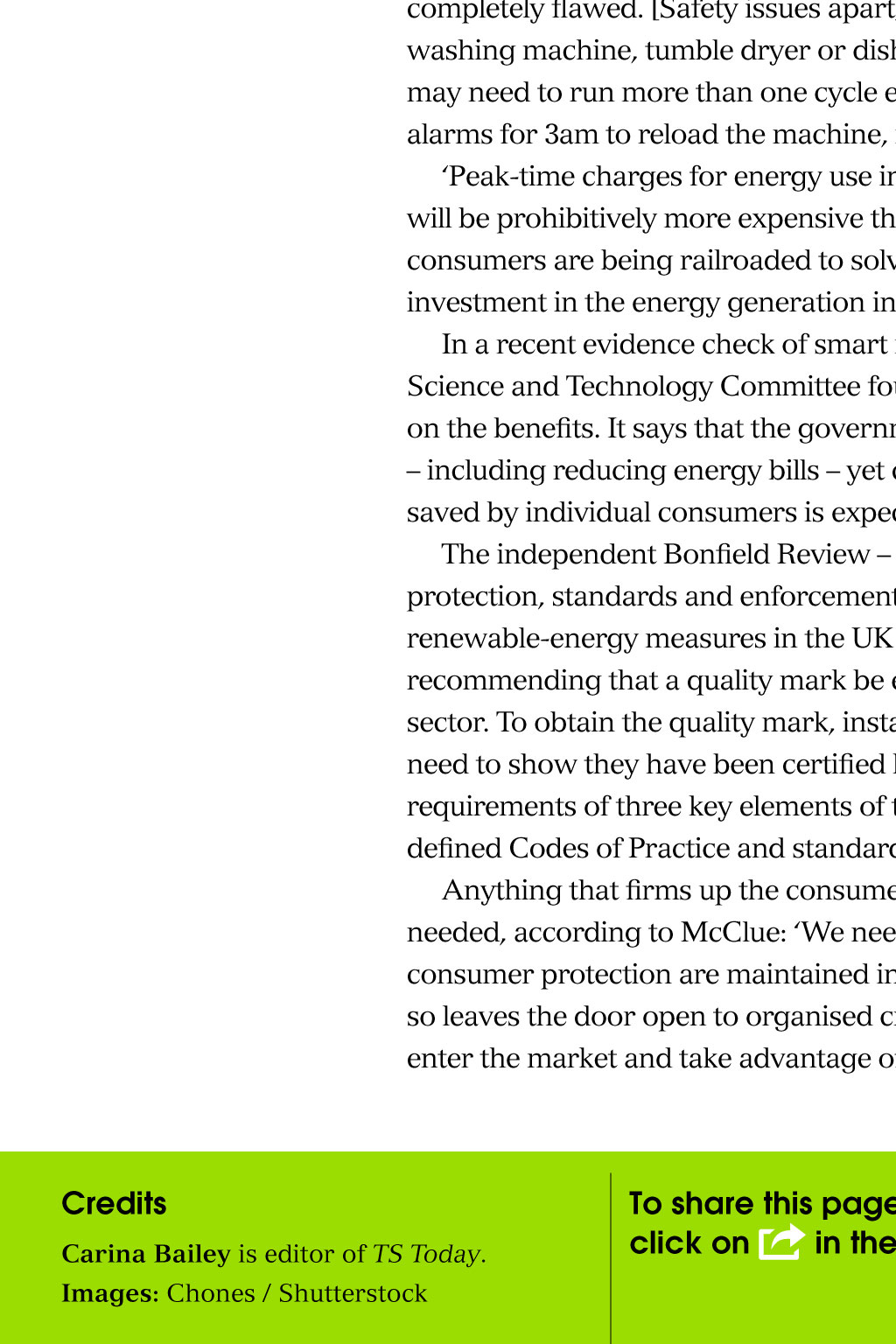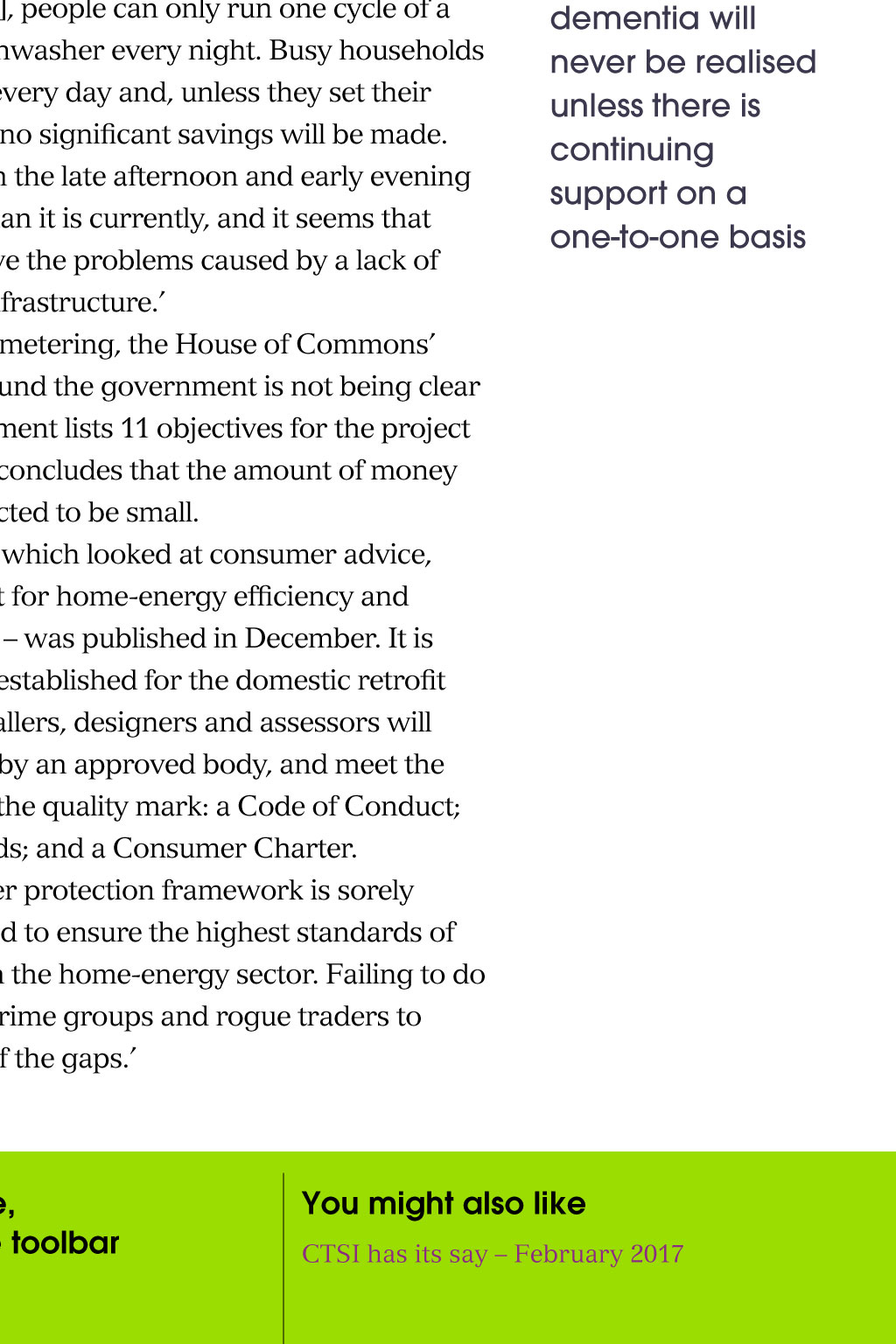




























Smart meters and battery storage In this feature l home energy l mis-selling l consumer protection Smart move? By 2020, smart meters will have been rolled out to every UK household but, after widespread mis-selling of the Green Deal, is this another consumer scandal in the making? Carina Bailey reports A The Green Deal has been a disaster for almost all involved. It increased suppliers costs, put some firms out of business and wasted 240m of taxpayers cash s trading standards begins to grasp the true scale of GreenDeal mis-selling, fears are growing that another energy scandal is brewing with smart meters, peak tariffs and battery storage taking lead roles in the second act of this rogue-trading tale. Between now and 2020, smart meters are being rolled out nationally, to update the UKs ageing energy network. As part of the governments and energy regulator Ofgems latest call for evidence, energy storage is being explored. This is likely to result in tariffs being introduced to both penalise energy use at peak times and make it more affordable during quiet periods. However, CTSI is extremely concerned that consumers will start to be offered a range of expensive battery storage systems by an army of coldcalling doorstep salesmen. The institute fears this will create a market ripe for rogue trading, similar to the one that occurred during the governments much-lauded Green Deal scheme. In its official response, CTSI lead officer for doorstep selling, energy and climate change, Steve Playle, says: Themarketing literature and sales pitch for such [battery storage] systems will undoubtedly stress the potential cost-saving benefits. However, such systems are largely untested and there is a real potential for widespread consumer exploitation. CTSI believes that promises of money savings will behighly inaccurate and unattainable. According to Craig McClue, CTSIs lead officer and policy executive, theGreen Deal led to hundreds of incidents of cold calling, mis-selling and exaggerated claims, the ramifications of which are still being felt and still being presented before the courts today. McClue fears the same could happen in the emerging battery storage sector during the smart-meter roll-out. He said: The Green Deal Code of Practice was supposed to protect consumers from unfair selling practices, such as the overselling of unsuitable measures and making false claims about the benefits. Unfortunately, largenumbers of approved salespeople ignored the spirit and detail of the Green Deal Code, engaging in rampant mis-selling of plans through misinformation, high-pressure sales and blatant lies. This behaviour resulted in: vulnerable consumers being stuck with credit deals that they were unaware they had undertaken some of which wont bepaid off in their lifetimes; soaring electricity bills; and, in several cases, aninability to sell or release equity in their home because of the Green Deal burden on it. McClue adds: Its probably fair to say that the Green Deal has been a bit of a disaster for almost all parties involved. It goes down as a failed government initiative that increased energy suppliers costs, put some firms out of business, wasted 240m of taxpayers cash and many millions more for other investors. If such a legacy isnt damning enough, it leaves huge numbers of vulnerable consumers with unwanted and unaffordable Green Deal and finance plans. The winners were, of course, the rogue traders, who profited by exploiting the Green Deals weak, yet complicated, consumer protection framework. The failure of the Green Deal leaves questions as to whether lessons have been learned, so that adequate protections for consumers andsanctions for unfair trading will be built into new energy initiatives. In Scotland, trading standards services and energy efficiency organisations are still dealing with the scale of the Green Deal mis-selling, with energy rogues forming a large part of major cross-authority investigations. Chief Officer of Trading Standards Scotland Fiona Richardson said: As new technologies develop, we must ensure that the industry does not mislead consumers as to the benefits of complicated products offering smarter metering or energy storage. Our experience suggests that rogue traders and organised crime groups will seek to take advantage by making false claims about the benefits and savings. McClue agrees: Energy-efficiency products and initiatives are welcome aswe seek to become a lower carbon economy with energy-efficient homes. However, where the initiatives are too complicated or where the benefits ofenergy-efficient products are unclear it is fertile ground for traders to mislead consumers. MaIN BarrIErS to StoragE Network connections Network charging Final consumption levies Planning Regulatory clarity State of play today According to Ofgem and the Department for Business, Energy and Industrial Strategy (BEIS), there is increasing interest in energy storage as a way of introducing flexibility into the UKs energy system. Costs of some storage technologies, especially batteries, are falling fast on a scale similar to that seen for solar PV. For example, lithium-ion battery costs fell around 14percent per year from 2007-2014, and are forecast to reduce further, albeitat aslower rate, between now and 2020. The number and volume of connection applications for storage is increasing rapidly, too; around 19GW of storage applications have been made to distribution network operators in recent months, while the National Infrastructure Commission has recommended that network owners should be incentivised by Ofgem to use storage (and other sources of flexibility) to improve the capacity and resilience of their networks as part of a more actively managed system. In recent years, security of energy supply has been a matter of particular concern for government, after a number of power plants had to close orbemothballed under EU law, or because of their age. This has led to organisations such as Ofgem investigating ways to avoid demand outstripping capacity which, according to CTSI, would result in power cutsfar more catastrophic now than they ever were back in the 1970s. But while Playle says that CTSI can fully understand the importance of ensuring security of supply, he fears that once smart meters have been installed energy companies will simply introduce an infinite number of impossible-togrEEN DEaL rESUrrECtED understand tariffs to smooth out the peaks and The governments axed Green Deal scheme is troughs of demand and, thereby, avoid the set to be brought back to life by private sector possibility of power cuts. investors in the City. Greenstone Finance and Aurium Capital Markets bought the Green Deal Finance How it will work It is envisaged that every home and small Company (GDFC) and its loan book for 40m. business will have its old gas and electricity Kilian Pender, founder of Greenstone Finance meters replaced with a smart meter by 2020 and the new CEO of GDFC, told Building thats 53 million in total. These will communicate magazine they were looking to get former Green directly with a consumers energy provider, so Deal installers back on the scheme. Over time meter readings and the use of estimated bills will we want to be one of the trusted brands in the energy space in the UK. be a thing of the past. Portable, wallet-sized The Green Deal offered consumers free or display units will, instead, show users exactly low-cost green home improvements, which were how much energy they are consuming at any paid off through energy bills. given time. However, Playle believes the concept of smart energy is extremely complex and quite difficult for the ordinary customers to understand fully. When it comes to a large number of vulnerable consumers, he believes smart energy will be completely baffling and likely to lead to anxiety and stress. Even the prospect of having a gas and electricity meter changed can be a serious worry, he says, and CTSI is concerned that, throughout the whole smart programme, there is little consideration for the needs of vulnerable consumers. The supposed benefits of in-home displays for an 80-year-old consumer with dementia will never be realised unless there is continuing support on a one-to-one basis. tariffs and smart appliances If tariffs are introduced, the cheapest is likely to be available in the middle of the night. However, Playle says there are only certain domestic tasks that people can do at this time. These are using a washing machine, dishwasher or tumble dryer but, given the ongoing fire-safety issue with Whirlpool tumble dryers, this is not a route CTSI would like to see BEIS and Ofgem opt for without consultation with the fire service. A fire caused by a domestic appliance that breaks out in the middle of the night is far more likely to lead to loss of life, says Playle. Given the current problems with more than five million Whirlpool tumble dryers, the fire service or Whirlpool itself would not condone their use. Playle also takes issue with the evolution of smart appliances that can identify the cheapest time to operate in relation to the consumers tariff. Again, he says the only appliances that will benefit from such technology will be a washing machine, tumble dryer or dishwasher. He is unconvinced that fridges and freezers operating in the middle of the night would be capable of maintaining a safe minimum operating temperature throughout the day. The time of use tariffs, where costs are much lower in the middle of the night, will have a small impact on the vast majority of consumers, Playle adds. The whole rationale behind smart meters is, in the view of CTSI, completely flawed. [Safety issues apart], people can only run one cycle of a washing machine, tumble dryer or dishwasher every night. Busy households may need to run more than one cycle every day and, unless they set their alarms for 3am to reload the machine, no significant savings will be made. Peak-time charges for energy use in the late afternoon and early evening will be prohibitively more expensive than it is currently, and it seems that consumers are being railroaded to solve the problems caused by a lack of investment in the energy generation infrastructure. In a recent evidence check of smart metering, the House of Commons Science and Technology Committee found the government is not being clear on the benefits. It says that the government lists 11 objectives for the project including reducing energy bills yet concludes that the amount of money saved by individual consumers is expected to be small. The independent Bonfield Review which looked at consumer advice, protection, standards and enforcement for home-energy efficiency and renewable-energy measures in the UK was published in December. It is recommending that a quality mark be established for the domestic retrofit sector. To obtain the quality mark, installers, designers and assessors will need to show they have been certified by an approved body, and meet the requirements of three key elements of the quality mark: a Code of Conduct; defined Codes of Practice and standards; and a Consumer Charter. Anything that firms up the consumer protection framework is sorely needed, according to McClue: We need to ensure the highest standards of consumer protection are maintained in the home-energy sector. Failing to do so leaves the door open to organised crime groups and rogue traders to enter the market and take advantage of the gaps. Credits Carina Bailey is editor of TS Today. Images: Chones / Shutterstock To share this page, in the toolbar click on The supposed benefits of in-home displays for an 80-year-old consumer with dementia will never be realised unless there is continuing support on a one-to-one basis You might also like CTSI has its say February 2017